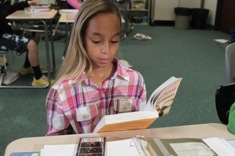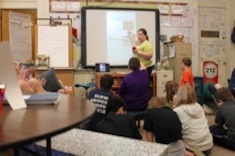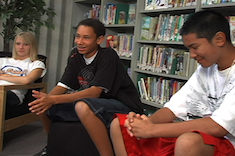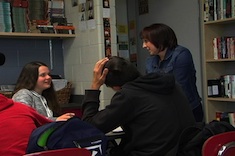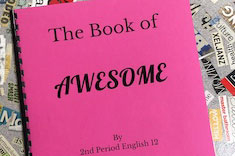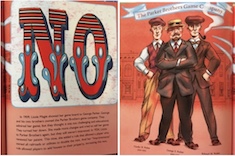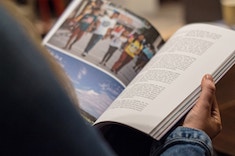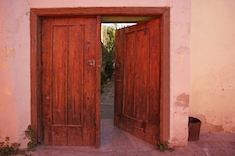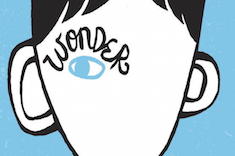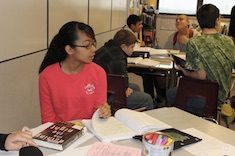12th
Latest Content
Quick Take: Share Your Reading Struggles
Instructional coach Staci Revere reminds us of the importance of modeling our own reading lives for students, especially the parts where we struggle as readers.
Teaching Students How to Email
Katherine Sokolowski outlines the nitty-gritty on how to teach students to organize, manage, and compose email.
Crafting Argumentative Essays
Gretchen Schroeder shares a summative assessment inspired by Song Exploder in which her high school students craft an argumentative essay defending a choice of a great song.
Writers’ Club
In her high school writing workshop, Julie Cox noticed that students wrote eagerly, but struggled to give and accept feedback. To increase student ownership and trust, she started Writers’ Club, and it affected transfer of learning in big ways!
Finding the Purpose in Antiracist Literature Instruction
Gretchen Schroeder shares her failures in preparing for antiracist literature instruction, and the principles she uses to empower meaningful conversations about race.
Making Connections with Sociograms
Gretchen Schroeder taps into the connections between characters by creating sociograms with her high school students.
Online Writing Notebooks
Gretchen Schroeder makes the leap to digital notebooks and finds new life in a tried-and-true practice.
What Do Readers Need?
Christy Rush-Levine offers a close look into the needs of readers by considering engagement, enrichment, and nourishment. She offers three examples of reading conferences with students.
A Student Book of Awesome
Gretchen Schroeder’s high school students build community by creating a shared text of things they love.
Using Picture Books for Rhetorical Analysis
Gretchen Schroeder finds that picture books are the perfect tool for rhetorical analysis with her high school students.
Fostering Cultural Awareness Through Book Clubs
Gretchen Schroeder’s students are almost all white and live in a rural community. She finds book clubs are a wonderful tool for expanding cultural awareness.
Flipping Literature Discussions
Gretchen Schroeder realizes her experiences from decades ago as a student are clouding her perspective on “flipped” literature discussions. Once she gets over her biases, she finds that online discussion of literature is a powerful equalizer for student voices.
Picture Books for Persona Poems
Gretchen Schroeder uses picture books to help her high school students understand and write persona poems.
Dealing with Lists in Style
Polysyndeton, asyndeton—if you are a writer and a word nerd, you will love Gretchen Schroeder’s suggestions for helping your students create lists with style in their writing.
Appointment Clocks
Gretchen Schroeder uses “appointment clocks” to ensure her students meet with a variety of peers for partner work.
Speed Reading
Adolescent learners can face daunting reading loads in high school that they need to tackle at home. Jen Schwanke has tips for how teachers and parents can work together to help teens develop strategies for dealing with a lot of complex reading quickly.
Forgetting and Remembering
In the end classroom management often comes down to students valuing the same things we do. Jen Schwanke has tips for how high school teachers can create a culture where there is better communication and more shared values.
Key Elements of Short Stories
Gretchen Schroeder finds her students’ enthusiasm for writing short stories flags quickly without some instruction and guidance.
Writer’s Notebook Tweaks
Gretchen Schroeder analyzes the use of writing notebooks in her classroom, focusing on what’s confusing or frustrating for students. She makes some small changes that yield big results.
The Power of Similes
If you want stronger poetry from students, a good starting point might be to explore how to write a powerful simile. Gretchen Schroeder explains how she helps her high school students play with and create better similes.
The Third (or More) Time Is the Charm
Gretchen Schroeder finds helping her students see the value in rereading poems is all about helping them pay close attention to imagery.
Hunting for Textual Evidence
Gretchen Schroeder finds just telling her high school class to include textual evidence when making points and arming them with sticky notes leaves many students bewildered. She regroups and comes up with activities to scaffold their understanding of what makes for valid evidence.
Teaching Tone: Deal Me In
Gretchen Schroeder’s high school students are surprised to see a deck of cards on their supply list. The cards are a tool for teaching the vocabulary of tone in creative ways.
Fear of Reading
Gretchen Schroeder reflects on why some of her students have developed a fear of reading by the time they reach high school.
When One Door Closes
Gretchen Schroeder finds new routines in her high school workshop means letting go of old expectations.
Flipping Negative Teacher Emotions
Gretchen Schroeder struggles to understand the meaning and value of her teaching when two former students overdose and die, another pleads guilty to murder, and yet another is arrested for domestic violence. She also looks at the corrosive effects of both apathy and envy. The result is a deep reflection on how teachers can move beyond sadness and other difficult emotions.
A Community Reads “Wonder”
Katherine Sokolowski had a dream — her whole community reading and celebrating the same book. She explains how she helped coordinate, organize, and purchase hundreds of books for a community-wide reading of Wonder.
Spoken Word Poetry
Gretchen Schroeder uses online videos as resources to teach her high school students to appreciate spoken-word poetry and write their own.
Choose Your Own Grammar Adventure
Gretchen Schroeder shares a quick exercise she’s developed for her high school students to hone grammar and editing skills using online video resources and individual Chromebooks.
Using Podcasts as an Alternative to Article of the Week
Gretchen Schroeder adapts the popular "Article of the Week" activity with podcasts as an alternative in her high school classroom, and shares some of her favorite podcasts to use with students.
Browse Content By
Type
Category
- Assessment Tools
- Big Fresh Archives
- Booklists
- Choice Numeracy
- Classroom Design
- Common Core
- Community Building
- Conferring
- Content Literacy
- Digital Literacy
- English Language Learners
- Equity
- Family Relations
- Free Samples
- Guiding Groups
- Leadership
- Literacy Coaches
- Mentor Texts
- Minilessons
- New Teacher Mentors
- Podcasts
- Poetry
- Quote Collections
- Reading Strategies
- Self Care
- Struggling and Striving Learners
- Talking and Listening
- Teacher Study Groups
- Teaching Reading
- Teaching Writing
- Word Study and Vocabulary
Author
- Melissa Quimby
- Nawal Qarooni
- Gwen Blumberg
- Julie Cox
- The Lead Learners
- Hannah Tills
- Josie Stewart
- Ruth Metcalfe
- Mallory Messenger
- Becca Burk
- Jodie Bailey
- Vivian Chen
- Mary Brower
- Tiffany Abbott Fuller
- Stephanie Affinito
- Ruth Ayres
- Leigh Anne Eck
- Heather Fisher
- Shari Frost
- Julie Johnson
- Suzy Kaback
- Gigi McAllister
- Shirl McPhillips
- Melanie Meehan
- Cathy Mere
- Debbie Miller
- Tara Barnett and Kate Mills
- Tammy Mulligan
- Dana Murphy
- Bitsy Parks
- David Pittman
- Brenda Power
- Heather Rader
- Matt Renwick
- Mandy Robek
- Christy Rush-Levine
- Gretchen Schroeder
- Jen Schwanke
- Brian Sepe
- Katherine Sokolowski
- Stella Villalba
- Jennifer Vincent
Grade Level
Choice Literacy Membership
Articles
Get full access to all Choice Literacy article content
Videos
Get full access to all Choice Literacy video content
Courses
Access Choice Literacy course curriculum and training

